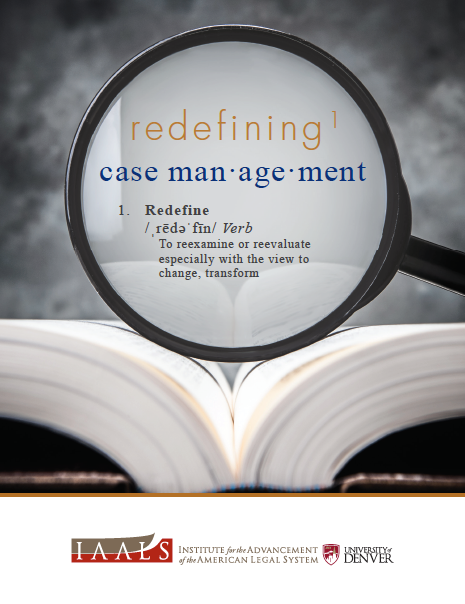Courts Can Improve Access to Justice by Managing Cases Better
America’s civil justice system is failing to deliver on the promise of a just, speedy, and inexpensive resolution in every case. However, by taking charge of cases from their beginning to end, courts have the power to change that. IAALS’ latest report, Redefining Case Management, offers strategies to help the courts take charge of the delivery of justice in response to the changing landscape in our courts.
“Judges must strategically manage cases, moving beyond the notion that case management is a chore to embracing case management for what it is—an essential aspect of service to the litigants who come to the court for resolution of their disputes,” explained Brittany Kauffman, who directs IAALS' work to reform the civil justice system. “The key is that the court is in charge of the progress of the case—making sure that it does not languish and that it receives the attention it needs.”
 Our civil justice system must first and foremost respond to the needs of those it serves. Case management techniques allow courts to meet those needs—in ways that are tailored and responsive to different case types, and also to the demands of users, from large companies to self-represented litigants. Looking first to the evolution of case management, IAALS’ report makes a case for 21st Century justice by outlining strategies that anchor a holistic vision for case management.
Our civil justice system must first and foremost respond to the needs of those it serves. Case management techniques allow courts to meet those needs—in ways that are tailored and responsive to different case types, and also to the demands of users, from large companies to self-represented litigants. Looking first to the evolution of case management, IAALS’ report makes a case for 21st Century justice by outlining strategies that anchor a holistic vision for case management.
Public opinion of the civil justice system is far lower than it should be. A recent survey by the National Center for State Courts suggests that “persistent concerns about customer service, inefficiency, and bias are undermining the public’s confidence in the courts and leading them to look for alternative means of resolving disputes or addressing problems that would have previously led them into the court system.” Courts can earn confidence by developing systems that are responsive, consistent, and fair.
“When judges and the courts take responsibility for managing the case, including recognizing and being responsive to the different needs of different cases, it can make the legal process more efficient and effective for all players in the process,” said Kauffman. “While courts are facing many challenges, there are also new opportunities through technology and evolving staffing models for courts and judges to embrace the management of cases.”





